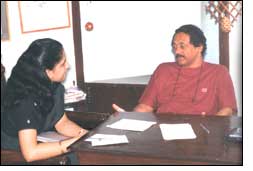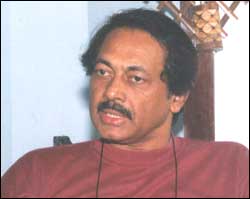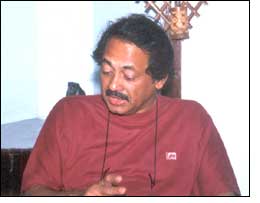 |
 |
 |
 |
 |
 |
 |

 |
|
 |
 |
 |
 |
 |
 |
 |
 |
 |
 |
 |
 |
 |
 |
 |
 |
 |
 |
 |
 |
 |
 |
| |

|

This page was updated on:
March 13, 2011
 |
| |
| |
|

 |
 |
 |
| |
Girish
Kasaravalli: Beyond the Mundane
To aficionados of good cinema, Girish Kasaravalli needs no
introduction. As a film maker he has hardly been prolific:
a mere eight films in a career of more than 25 years. And
yet he is the only director to have the distinction of winning
the Swarnakamal or the Golden-lotus award four times. A product
of the Film and Television Institute of India, Pune, Kasaravalli's
films may lack 'mass appeal' but as serious works that focus
on the social and political ethos and the forces that make
an individual behave in a particular manner, they are in a
class all their own. Rather than telling the story of an individual,
his cinematic attempts have been to set the stories of individuals
against a larger political and social canvas caught in transition
in various points in Indian history. Kasaravalli pens his
own scripts, firmly believes in sparse dialogues and plans
his films to the minutest detail.
In an extended conversation with viggy.com, Kasaravalli
shares his thoughts on his films, and his career as a film
maker. Excerpts:
You have been in the film
industry for 20-25 years. What have been the up and downs
in your career as a film maker? 
Till date I have made eight films and one tele-film, Bannada
Vesha, and that was for Doordarshan. I retrospect, I think,
that should have been made as a film. That way I would perhaps
have done greater justice to the subject, and the film would
have had a better finish, technically speaking. Still, it
was okay.
As a film-maker, my journey, from my first film Ghatashraddha
to my latest, Dweepa, has been a continuum. I have
always believed a film should reflect some facet of life,
the reality around us. Take Ghatashraddha. It is based on
a short story by U. R. Ananthamurthy, which I had read while
I was in high school. The story left a deep impression on
me, more so because it mirrored life in a particular social
milieu, and the trials and tribulations of an individual caught
in that milieu. When I made Ghatashraddha. in the seventies,
I was already a product of the Pune Film Institute. Interestingly,
even while I was in my final year (1975) , I had assisted
B.V. Karanth with the making of Chomandudi. Ghatashraddha.
was an attempt to look at life from the point of view of a
person whose struggles were largely because she - a widow
-- happened to belong to a lower caste in a society which
was highly caste conscious. Incidentally, both Ananthamurthy
and myself are from Thirthalli; to be more precise, I am from
a village close of Thirthalli.
In the eighties, came Moorudarigalu and Akramana. I must confess
I did Akramana not so much out of choice as to help out a
friend, R. Nagesh (currently head of the Nataka Academy).
I was the film's art director. Moorudarigalu, which followed,
was based on Yashwanth Chittal's novel. I am afraid I failed
to do justice to it. The structure of the novel was so complex,
so fascinating, a kind of flash-back within a flash-back within
a flash-back. Unfortunately it so happened that, lots of material
had to be destroyed in the processing lab due to some technical
problem. Unlike today's digital technology, manual editing
has to be done very carefully. We literally lost several shots.
What emerged at the end of it all was a linear narrative,
the kind that the audience could understand but one that did
no justice to that magnificent novel.
 Looking
back, I think I made a big mistake by not being hands-on while
the film was being edited. You see I had taken up a job in
an institute soon after Ghatashraddha. Consequently, both
Moorudarigalu and Akramana suffered. In those days, when there
was no digital technology, you had to be very careful in editing.
There was no way you could recover frames that got snipped
off by mistake. After this rather unhappy experience with
these two films, I decided that I should either concentrate
on the job I had taken up or do films full-time. I chose the
former. It turned to be an extended break -- 7-8 years. Looking
back, I think I made a big mistake by not being hands-on while
the film was being edited. You see I had taken up a job in
an institute soon after Ghatashraddha. Consequently, both
Moorudarigalu and Akramana suffered. In those days, when there
was no digital technology, you had to be very careful in editing.
There was no way you could recover frames that got snipped
off by mistake. After this rather unhappy experience with
these two films, I decided that I should either concentrate
on the job I had taken up or do films full-time. I chose the
former. It turned to be an extended break -- 7-8 years.
When I turned to film making again, it was as a full-timer.
I had quit my job. The project I took up was Tabarana Kathe,
based on a short story by Poornachandra Tejasvi. I started
working on the script at the behest of the original producer
who eventually backed out. Then NFDC entered the picture,
liked my script and gave me the go-ahead. It was a smooth
relationship. Unlike Ghatashraddha, we portrayed Tabara not
in the manner of an outsider who looked at him and his situation
with a critical eye but from Tabara's own perspective. He
was a creature of his time, a man who admired bureaucracy
and yet was suppressed by it.
What was your experience working
with Charu Hassan?
Charu Hassan was just a supporting actor when I made Tabarana
Kathe. I picked him because he seemed just right for the role:
lean, tall, rangy with a face that suited the character he
was to play. I got in touch with Charu, who was based in Chennai,
though my cameraman, Madhu Om Bhat. I met him only when I
got word from Madhu that he was willing to do the role. He
was so enthusiastic ! Only later, I discovered how great an
actor he was. His was a fine performance - one of the finest,
I should say -- in my films.
Initially, I was a bit unsure as to how to initiate Charu,
an urbane man who also happens to be a criminal lawyer, into
the role of Tabara, a rustic. So I called him over Mudgere
to stay with us, a week in advance of the shooting. Writer
Tejaswi (on whose story Tabarana Kathe is based), had once
pointed out a lowly postal employee - a local -- to me, and
said the character of Tabara was modeled on him. So it was
natural that I should ask Charu to observe him (the postal
employee) for a few days. Charu, though, seemed somewhat reluctant.
Not only that: he even declined to mug up the Kannada dialogues,
saying he can do without it! I now was convinced that I had
made a mistake, afraid it was going to be flop show ! Imagine
my surprise then, when on the first day of the shoot who should
I espy but Charu standing by my side - a Charu whom I failed
to recognize for a minute. Gone was the sophisticate, the
suave criminal lawyer. In his place, was a tall man, slightly
hunched, clad in a frayed postman's uniform, a cloth bag slug
on his shoulder. I was dumbfounded: Tabara had just come to
life - and how ! And he did the dialogues in a style all his
own. He would not listen when I asked him to repeat dialogues
after me, so that there was no long pauses between lines.
Instead, when the shot was ready, he would simply deliver
the first line of dialogue even while listening to the second.
It was simply amazing ! There were no pauses at all.
When Dweepa will be released?
I really do not know. The question is better addressed to
the producer. Once my job as director is done, the ball is
firmly in the producer's court. The producer's job is not
easy: he has to find the right theater, distributors, find
money for publicity… Sometimes the producer keeps me in the
picture, sometimes not. I think Dweepa will be released shortly.
Do you consider a non- Kannadiga
audience as well while making a film? Are yours films made
in English simultaneously?
 While
all my films have English subtitles, making English versions
is a different matter. The sharp differences in syntax between
these two languages makes it difficult. It's not so in the
case of south Indian languages such as Telugu and Tamil .
There are lots of commonalities between the south Indian languages.
The other option, of course, is to shoot in two languages,
which is what we did in the case of Dweepa. That was an experiment.
We shot in Kannada and English simultaneously. The English
version is not ready though. While
all my films have English subtitles, making English versions
is a different matter. The sharp differences in syntax between
these two languages makes it difficult. It's not so in the
case of south Indian languages such as Telugu and Tamil .
There are lots of commonalities between the south Indian languages.
The other option, of course, is to shoot in two languages,
which is what we did in the case of Dweepa. That was an experiment.
We shot in Kannada and English simultaneously. The English
version is not ready though.
How important, in your view, are
'Technical Qualifications' in this field?
Like in any art, qualifications matter in cinema too, but
basically you need to be a creative person. Technical background
and training does help, but it's not all. If that were the
case, the 300-odd people who passed out of the Pune Film Institute
over the last three decades and set themselves up as directors
should all have become famous. To be a successful director
you need great powers of observation, thorough understanding
of the subject. You learn from watching a lot of films, the
works of other directors; you need to do your home work well.
In my case, the effort that goes in is all the more because
I work on very tight budgets.
Have you ever felt that your films
haven't got the response they deserve?
Well, the infrastructure here (in Karnataka) is not all that
good. Also, exhibitors, distributors, etc. don't seem too
keen on the kind of films I choose to make. So it's somewhat
difficult to judge how well - or poorly - my films have gone
down with the public. If a film does not even get released,
how can one blame the director.
You have won four 'Swarna Kamal'
awards, you are close to breaking Satyajit Ray's record of
six 'Swarna Kamals'….
Well, I might well equal Satyajit Ray's record one day in
terms of Swarna Kamals but I can never claim to be his equal
in stature. Some directors are of a class all their own. Take
the Italian director Michaelangelo Antonioni. He made very
few films, but his very first was so different that it stood
out. He was his own man: indifferent to bouquets and brickbats.
And yet his films came in for high acclaim, and amongst the
many awards that came his way was an Oscar - for life-time
achievement. My point is, there are many talented people around.
Some come to be recognized, some not.
How was it work with B.V. Karanth
?
What I admired in him most, learn a lot from him, was that
enormous capacity of his to get the most out of actors. He
was not a snob. Success did not turn his head. He was always
open to criticism, to different points of a view. A good listener,
and a very nice person.
People feel that your TV serial `Gruha
Bhanga' has deviated quite a bit from the novel on which it
is based…
Well, I have tried to tone down the character of Nagi, made
her speak in a language more appropriate to that kind of character.
I have tried to give her character a deeper feel, wanted viewers
to appreciate her point of view, empathize with her, a woman
who is widowed while quite young. I wanted to show the various
shades of her character, not present just a black-and-white
picture. I did not want it to be reduced to the familiar evil
mother-in-law and the suffering daughter-in-law kind of situation.
My attempt, in portraying these two characters, was to strike
a sort of balance.
How do you manage your personal life?
No problem, really. May be because both I and my wife are
from the same field, we understand what it takes. Basically,
we understand each other. Give each other a lot of space,
when work demand it.
Interviewed by Roopa
Hegde
Special thanks to Mr. Raghavan N for helping us stylize
this exclusive interview.
This
interview in Kannada |
|
| |
|
|
|

|
